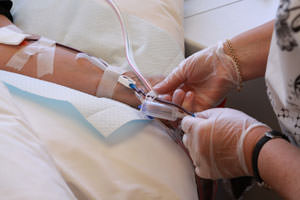Climate Change’s Infecting Europe’s Blood Banks
With temperatures rising drastically all over the world, European countries have seen a rise in tropical diseases. This could spell trouble for their blood donations since the pathogens are unprecedented on the Western continent.
With temperatures rising drastically all over the world, European countries have seen a rise in tropical diseases. This could spell trouble for their blood donations since the pathogens are unprecedented on the Western continent. Some of the diseases have undetectable symptoms and thus blood donors could be unaware they’ve been affected.
Moreover, the warm climate has attracted carriers such as mosquitoes, ticks and flies that once avoided the unfavorable European weather. Scientific American gives an account of the increased diseases:
During the summer heat wave of 2010, when global average temperatures reached a 30-year high, an outbreak of West Nile fever erupted in southeastern Europe. The first cases were in Greece, where 261 cases and 32 deaths were reported. Although West Nile virus had been seen in animals, these were the first reported cases in humans.
Additional cases were reported in Romania, Hungary and parts of Russia. In total, there were 900 confirmed cases.
Europe also saw its first case of nonimported dengue fever in 2010, when a local case was reported in southern France. More than 1,000 cases of the disease are brought into Europe every year from areas where it’s endemic, usually by migrants or visitors predominantly from urban areas in Asia and South America.
But until 2010 there were no locally originating cases. The patient in question had not been traveling outside Europe and could have contracted the disease only by being bitten in France by a member of the vector species, the Asian tiger mosquito (Aedes albopictu).
Since then, the Asian tiger mosquito has been found over a substantial area in Europe. In 2012, colonies were found in 20 European countries, as far north as Germany, Belgium and the Netherlands, as far south as Sicily and as far east as Croatia.
…Although transfusion-transmitted cases of diseases such as West Nile and dengue fever, both carried by mosquitoes, have not been documented in Europe, there have been several cases of transfusion-transmitted leishmaniasis. Leishmaniasis is normally transmitted to humans through the bite of infected female sand flies.
Although the blood banks can very well turn away potential donors for traveling to countries where new pathogens may have been acquired, this can limit the amount of blood they accept and cause a shortage. Maybe this will get some policymakers’ blood boiling enough to do a better job of protecting the environment.
—Posted by Natasha Hakimi
Your support matters…Independent journalism is under threat and overshadowed by heavily funded mainstream media.
You can help level the playing field. Become a member.
Your tax-deductible contribution keeps us digging beneath the headlines to give you thought-provoking, investigative reporting and analysis that unearths what's really happening- without compromise.
Give today to support our courageous, independent journalists.








You need to be a supporter to comment.
There are currently no responses to this article.
Be the first to respond.